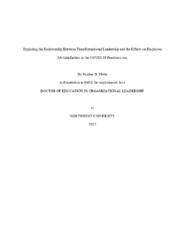| dc.contributor.advisor | Alsbury, Thomas | en |
| dc.contributor.author | Elwin, Pauline B. | en |
| dc.date.accessioned | 2022-09-12T21:49:46Z | |
| dc.date.available | 2022-09-12T21:49:46Z | |
| dc.date.issued | 2022 | en |
| dc.identifier.uri | archives.northwestu.edu/handle/nu/59101 | |
| dc.description | A dissertation presented to the faculty of the Center for Leadership Studies at Northwest University in partial fulfillment of the requirements for the degree of Doctor of Education in Organizational Leadership. | en |
| dc.description.abstract | The COVID-19 pandemic has had a devastating impact on the ways organizations function. Social distancing has altered the ways organizations traditionally operated and caused significant challenges for employees, leading to employee turnover. Employee turnover is important to address because high attrition can extensively affect companies, directly and indirectly, resulting in increased hiring, training cost, lost production, reduced profits, and overall lower employee morale. Grounded in Bass’s model of transformation leadership, the purpose of this mixed-methods grounded theory study using an integration of quantitative and qualitative research was to explore the existence of an association between transformational leadership and employee job satisfaction during the COVID-19 pandemic era in a local government organization in Washington state. There were six research questions that directed the study around the dimensions of transformational leadership. Through a purposeful sampling technique, 20 employees from a division in this government organization participated in this study. Data were collected through two surveys in Survey Monkey, which were transferred to SPSS, and through open-ended interviews, done through Zoom Video Communications Inc., transcribed, and transferred to NVivo software for data analysis and interpretation. Seven themes emerged from the analysis: support, communication, leadership, telework, empowerment, safety, and trust. The study was also triangulated, which demonstrated the study’s validity between the quantitative and qualitative data. The general results of this study showed a statistically significant association between transformational leadership and employee satisfaction. While the literature review and data analysis present a convincing case for transformational leadership and employee satisfaction in general, elements of intellectual stimulation and idealized influence (behaviors) were not significant. This indicated that not all the dimensions of transformational leadership correlated with improving employee job satisfaction which appears to be an anomaly of the COVID-19 pandemic. | en |
| dc.format.extent | 166 pages | en |
| dc.format.medium | DOCX | en |
| dc.language.iso | en | en |
| dc.publisher | Northwest University | en |
| dc.rights | This original work is protected by copyright. Copyright is retained by the author(s). Works may be viewed, downloaded, or printed, but not reproduced or distributed without author(s) permission. | en |
| dc.rights.uri | http://archives.northwestu.edu/page/copyright | en |
| dc.subject | Transformational leadership | en |
| dc.subject | COVID-19 Pandemic (2020-) | en |
| dc.subject | Pandemics | en |
| dc.subject | Job satisfaction | en |
| dc.title | Exploring the Relationship Between Transformational Leadership and the Effects on Employee Job Satisfaction in the COVID-19 Pandemic Era | en |
| thesis.degree.name | Doctor of Education in Organizational Leadership | en |
| thesis.degree.level | Doctoral | en |
| thesis.degree.grantor | Northwest University | en |
| thesis.degree.discipline | Center for Leadership Studies | en |


 Maintained by the Northwest University Library
Maintained by the Northwest University Library